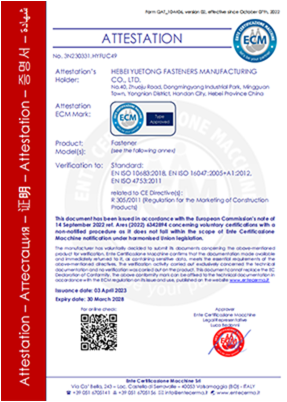Dec . 14, 2024 02:21 Back to list
6mm Expansion Bolt Applications and Benefits for Various Construction Projects
Understanding 6mm Expansion Bolts
Expansion bolts are essential fasteners used in various construction and industrial applications. Among these, the 6mm expansion bolt stands out for its versatility and reliability. These bolts, typically made from high-strength materials, are designed to anchor objects to solid substrates such as concrete or masonry. In this article, we explore the functions, benefits, installation procedures, and applications of 6mm expansion bolts.
What is a 6mm Expansion Bolt?
A 6mm expansion bolt is a type of fastener that consists of a bolt, a sleeve, and a cone or wedge. When the bolt is tightened, it pulls the cone into the sleeve, which expands against the sides of the drilled hole. This mechanism creates a secure grip on the material, allowing the bolt to bear significant loads without loosening or pulling out. The 6mm designation refers to the diameter of the bolt, making it suitable for lighter to moderate applications.
Advantages of Using 6mm Expansion Bolts
1. Versatility One of the key advantages of 6mm expansion bolts is their ability to be used in a variety of materials, including concrete, brick, and stone. This versatility makes them a preferred choice in many construction and renovation projects.
2. High Load Capacity Despite their relatively small size, 6mm expansion bolts can hold substantial weight when properly installed. This makes them ideal for securing fixtures such as shelves, brackets, and machinery.
3. Ease of Installation Installing 6mm expansion bolts is straightforward. The process typically involves drilling a hole, inserting the bolt, and tightening it with a tool. This simplicity allows both professionals and DIY enthusiasts to use them effectively without the need for specialized equipment.
4. Corrosion Resistance Many 6mm expansion bolts are coated or made from corrosion-resistant materials, ensuring durability even in harsh environments. This characteristic is particularly important for outdoor applications where exposure to moisture and other elements can lead to rust and deterioration.
Installation Process
Installing a 6mm expansion bolt involves several steps
6mm expansion bolt

1. Select the Right Location Identify the spot where the bolt will be secured. Ensure it is in a stable area of concrete or masonry.
2. Drilling the Hole Use a hammer drill and the appropriate diameter drill bit to create a hole that's slightly deeper than the length of the bolt. For a 6mm bolt, a 6mm drill bit is typically used.
3. Inserting the Bolt Place the expansion bolt into the hole. Ensure that the cone or wedge is positioned correctly for proper expansion.
4. Tightening Using a wrench or socket, tighten the bolt until the sleeve expands securely against the wall of the hole. Ensure it is tight, but avoid over-tightening, which can damage the material.
5. Final Check Once installed, check for tightness and stability. A properly installed expansion bolt should not move when pressure is applied.
Applications of 6mm Expansion Bolts
6mm expansion bolts are used in various applications, including
- Furniture Assembly They are commonly used to secure shelving units, cabinets, and other furniture to walls for increased stability. - Mechanical Installations In industrial settings, these bolts can anchor machinery and equipment to the ground or other structures. - Construction Projects Contractors often use these bolts for attaching fixtures, brackets, and supports in both residential and commercial buildings. - Outdoor Structures Due to their durability, they are frequently used in outdoor applications like decks and fences, where they can withstand environmental stressors.
Conclusion
In summary, 6mm expansion bolts are invaluable tools for securely fastening objects to concrete and masonry. Their ease of use, load-bearing capacity, and versatility make them ideal for a wide range of applications, from furniture assembly to construction projects. By following proper installation techniques, users can ensure a secure and lasting bond, making 6mm expansion bolts a reliable choice in various scenarios. Whether you are a professional contractor or a DIY enthusiast, understanding the unique features and applications of these bolts will enhance your fastening solutions.


